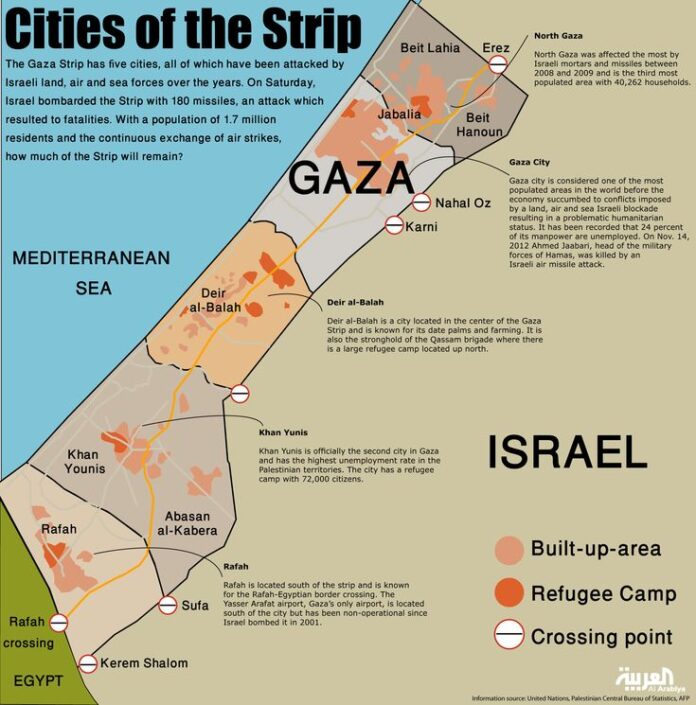As the Gaza Strip remains embroiled in a devastating conflict, hundreds of foreigners and dual nationals sought refuge in Egypt on Thursday, while Israeli forces continued their intense bombardment and ground battles within the besieged Palestinian enclave. This ongoing crisis, which has been ongoing since October 7, has resulted in a staggering death toll, compelling many residents to search for safety beyond the Gaza borders.
Egypt has initiated a collaborative operation with international partners to evacuate approximately 7,000 foreigners through the Rafah crossing, the primary transit point between Gaza and Egypt. On the first day of evacuation, about 100 individuals successfully crossed the border, with more evacuees expected to follow in the days ahead.
By the close of the second day of evacuations, nearly 400 foreign passport holders and 60 severely injured Palestinians had managed to leave Gaza. Among these evacuees were hundreds of U.S. citizens, in addition to 50 Belgians, as well as smaller numbers from various European, Arab, Asian, and African countries.
These evacuees shared their tales of the dire circumstances they faced in Gaza. A 14-year-old U.S. passport holder, Salma Shaath, painted a bleak picture: “There was no access to food, water, or gas, and nowhere to find shelter. People were forced to seek rest in hospitals; the casualty count is soaring. Communication was severed with no access to the internet or electricity. Our own house was devastated by bombings, which ultimately led us to seek refuge here in Rafah.”
However, it’s vital to acknowledge that this evacuation effort represents only a fraction of the 2.4 million people trapped in Gaza, who have been enduring weeks of relentless bombardment since the conflict escalated following a Hamas incursion into Israel.
International initiatives have been launched to deliver humanitarian aid to those affected by the crisis. The United Kingdom has initiated the shipment of 30 tonnes of aid to Egypt, including forklift trucks, belt conveyors, and lighting towers. These resources are aimed at accelerating the processing of humanitarian aid deliveries at the Rafah border crossing.
While evacuations are underway, U.S. Secretary of State Antony Blinken embarked on his second visit to the Middle East since the outbreak of the crisis. His visit includes stops in Israel and, subsequently, Jordan.
The situation on the ground remains highly volatile. Ground battles reignited in northern Gaza, with Israel’s army chief, Lt Gen Herzi Halevi, declaring that troops were now within Gaza, laying siege to Gaza City, and intensifying their presence within areas held by Hamas.
Israel’s military is also committed to securing the release of prisoners, both civilian and military, who have been taken captive by Hamas. Unfortunately, Hamas reported that seven of the approximately 242 prisoners in their custody lost their lives in bombings on Tuesday. Israel has reported that 332 of its soldiers have died during the operation in Gaza.
The focus now shifts to the grueling urban warfare deep within Gaza, where Hamas has reportedly reinforced its positions. The Hamas-run health ministry has reported a devastating toll, with more than 9,000 people losing their lives in Gaza, primarily women and children.
Concurrently, Lebanon’s Hezbollah launched an attack on 19 Israeli positions along the border, triggering a broad retaliatory response. Rocket attacks from the border resulted in injuries to two individuals in the Israeli town of Kiryat Shmona, near the Lebanese border, according to Israel’s emergency medical service.
Of particular concern is the repeated head of the Jabalia refugee camp, the largest in the region. The densely populated camp, located north of Gaza City, has suffered significant explosions leading to the collapse of residential buildings. According to the Hamas-administered administration, 195 Palestinians lost their lives in the wake of two days of Israeli strikes on Jabalia, with hundreds more unaccounted for and wounded.
Major strikes also impacted Gaza’s Bureij refugee camp and an area near a UN-operated school in Jabalia, where the health ministry reported 27 casualties.
Amid the crisis, civilians in Gaza have sought refuge wherever they can. Outside the Al Quds Hospital in Gaza City, displaced residents desperate for safety from Israeli strikes expressed their anguish. Hiyam Shamlakh, a 50-year-old resident, stated, “This is not a life. We need a safe place for our children; everybody is terrified, children, women, and the elderly.” Others shared similar sentiments, highlighting the urgent need for a ceasefire.
Eyewitnesses recounted the devastating attack on Jabalia, where rescuers frantically searched through the rubble and twisted metal to locate survivors and retrieve bodies. Emergency responders conveyed that “whole families” had perished in the rubble. Gaza’s overwhelmed hospitals are grappling with a shortage of medical supplies and electricity, further exacerbating the humanitarian crisis.
Simultaneously, violence has erupted in the Israeli-occupied West Bank, where over 130 Palestinians have lost their lives in the past month, according to the Palestinian Authority (PA). On Thursday, the PA reported that three Palestinians were killed by Israeli gunfire in the West Bank.
Despite the dire humanitarian situation, the World Health Organization (WHO) has raised concerns about the lack of safety guarantees for delivering humanitarian aid to Gaza. The WHO expressed the near-impossibility of delivering medical supplies to hospitals in Gaza and warned that health needs in the Palestinian enclave are soaring while the ability to address them is rapidly declining.
The UN health agency has succeeded in delivering 54 metric tonnes of humanitarian supplies into the territory over the past two weeks. Still, it acknowledges that this is insufficient to meet the scale of needs. “WHO will do everything we can to ensure that all people in Gaza have access to life-saving health and humanitarian services,” said WHO chief Tedros Adhanom Ghebreyesus during a press conference on Thursday.


